Unit 3 Welcome to Sunshine Town Grammar(共37张PPT)
文档属性
| 名称 | Unit 3 Welcome to Sunshine Town Grammar(共37张PPT) |
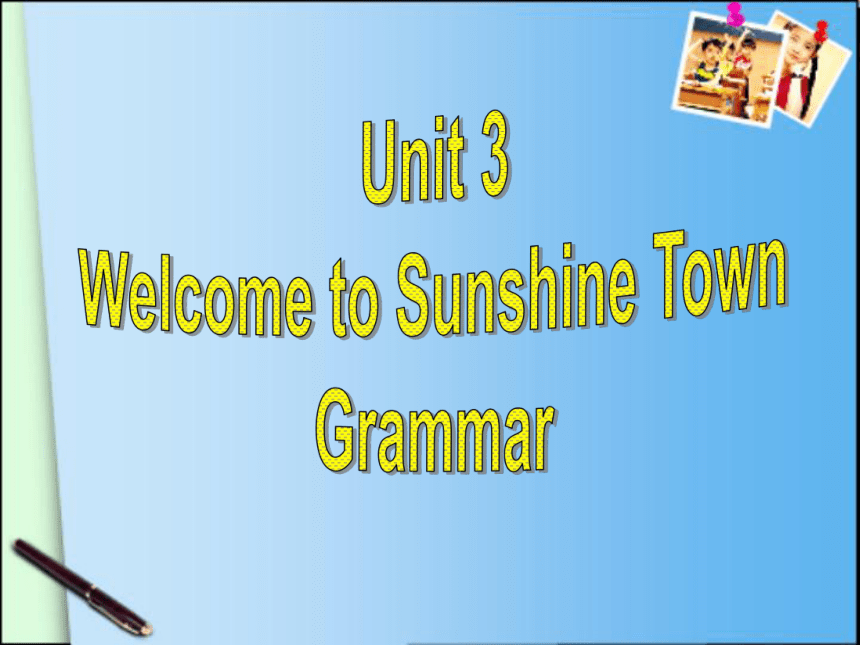
|
|
| 格式 | zip | ||
| 文件大小 | 3.2MB | ||
| 资源类型 | 教案 | ||
| 版本资源 | 牛津译林版 | ||
| 科目 | 英语 | ||
| 更新时间 | 2020-02-10 00:00:00 | ||
图片预览

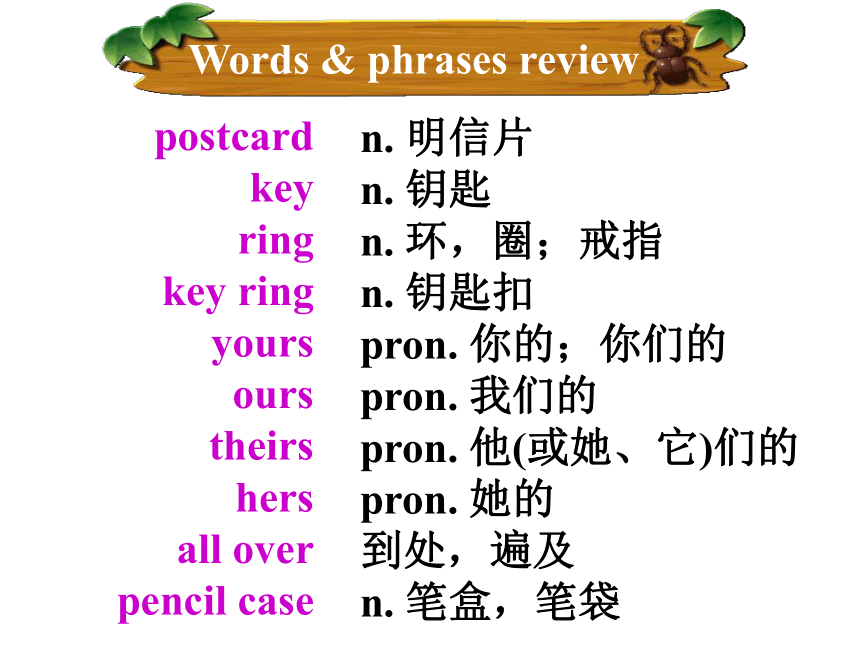
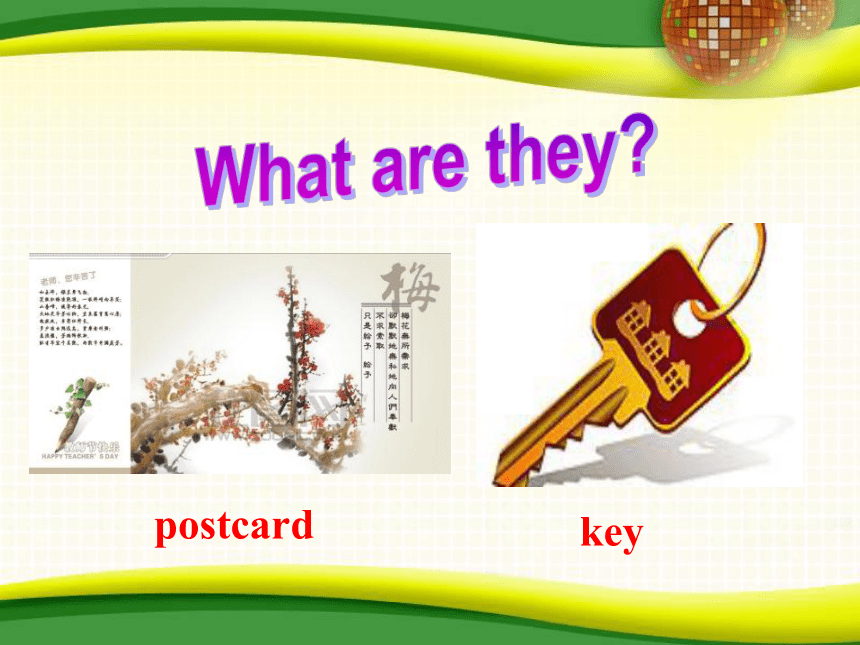
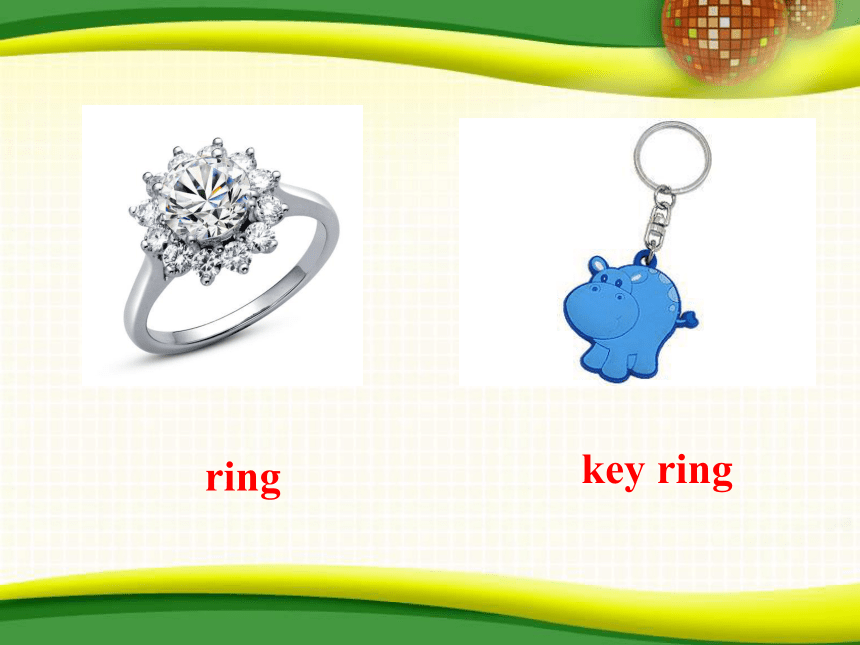
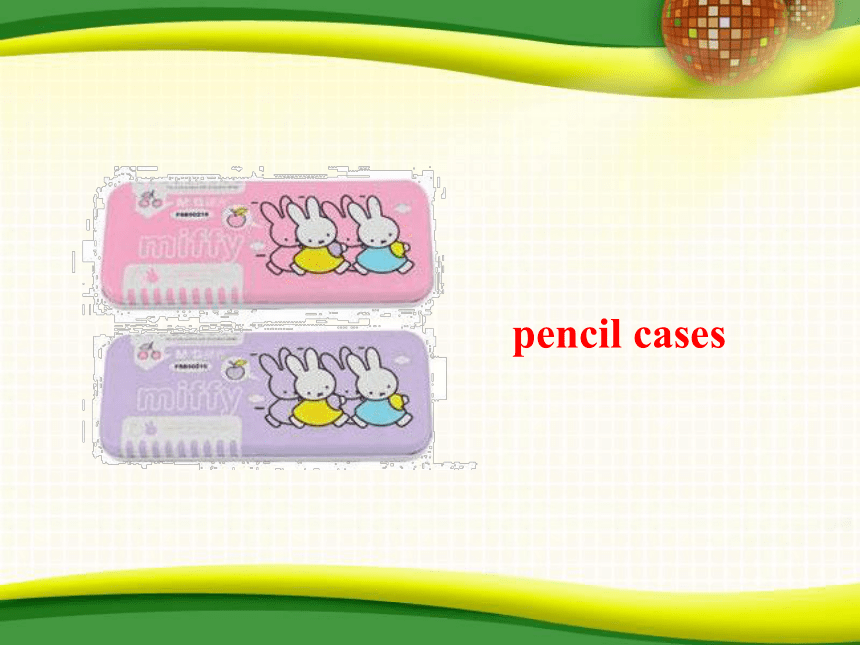
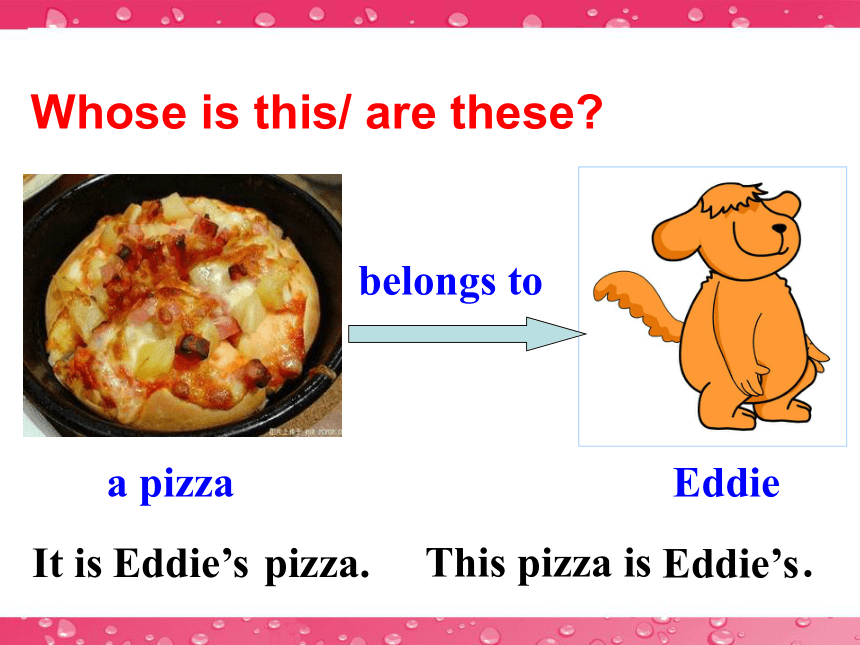
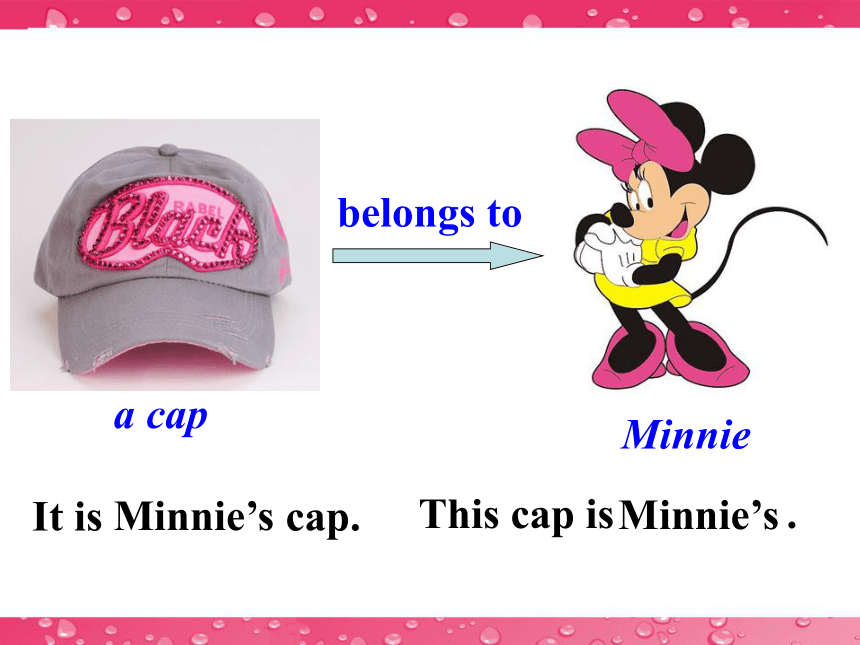
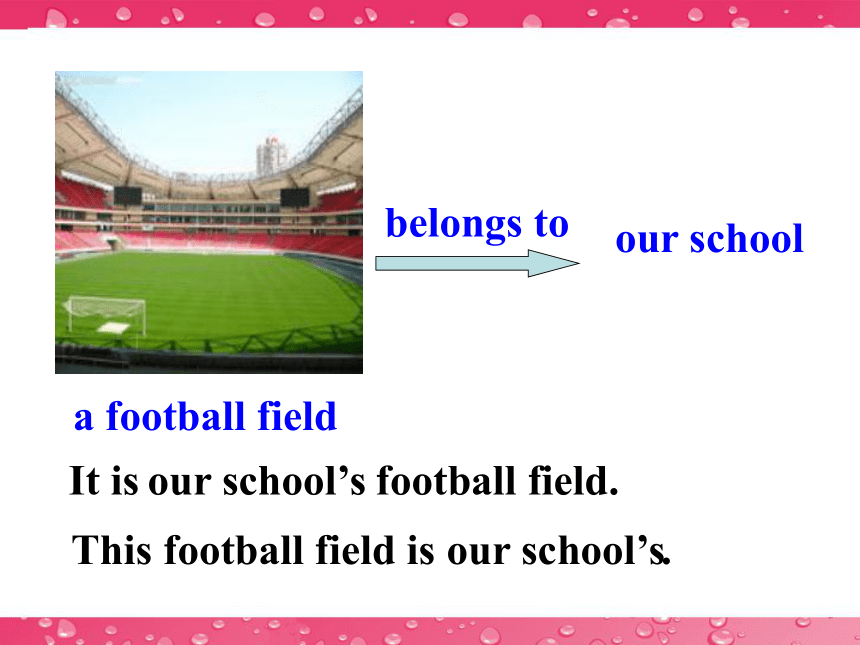
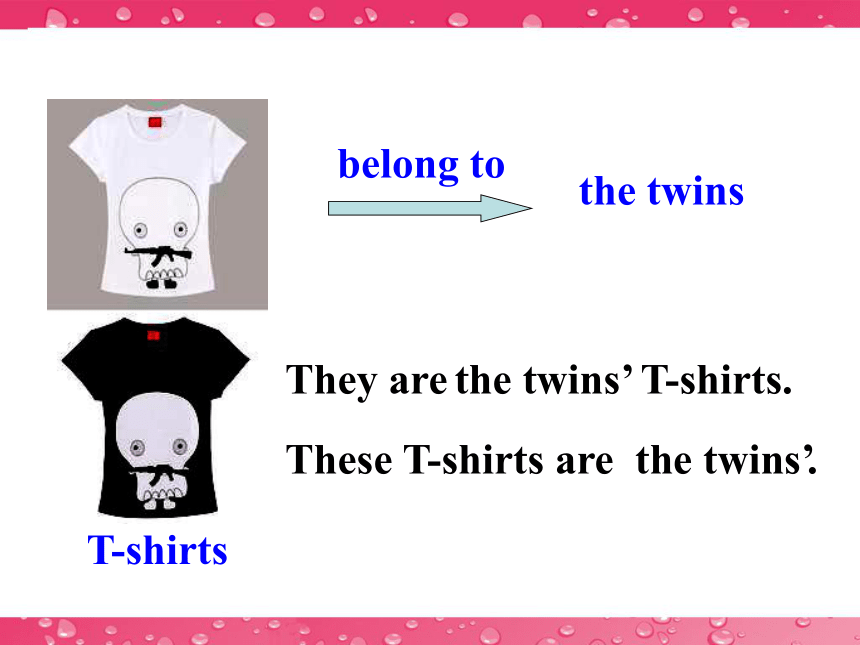
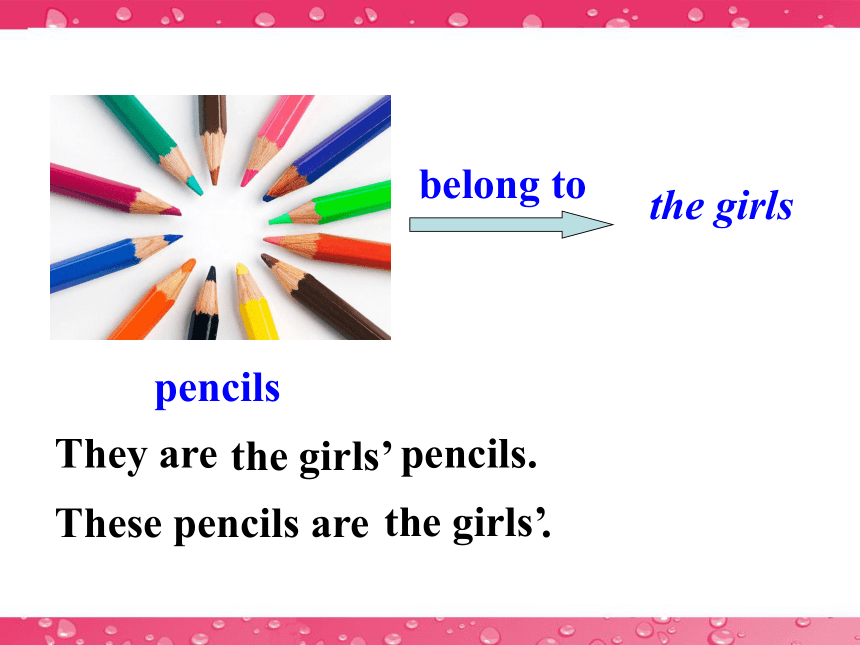
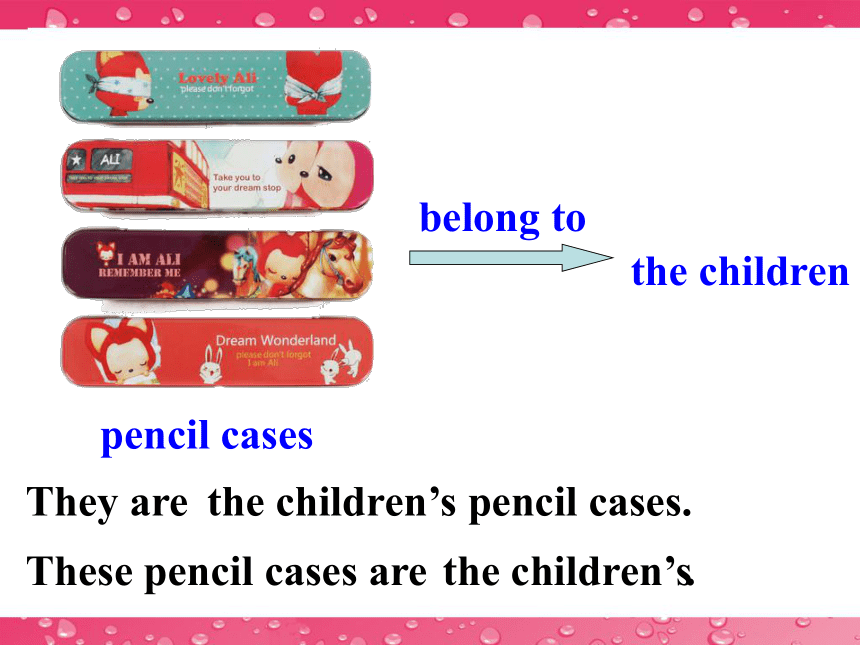
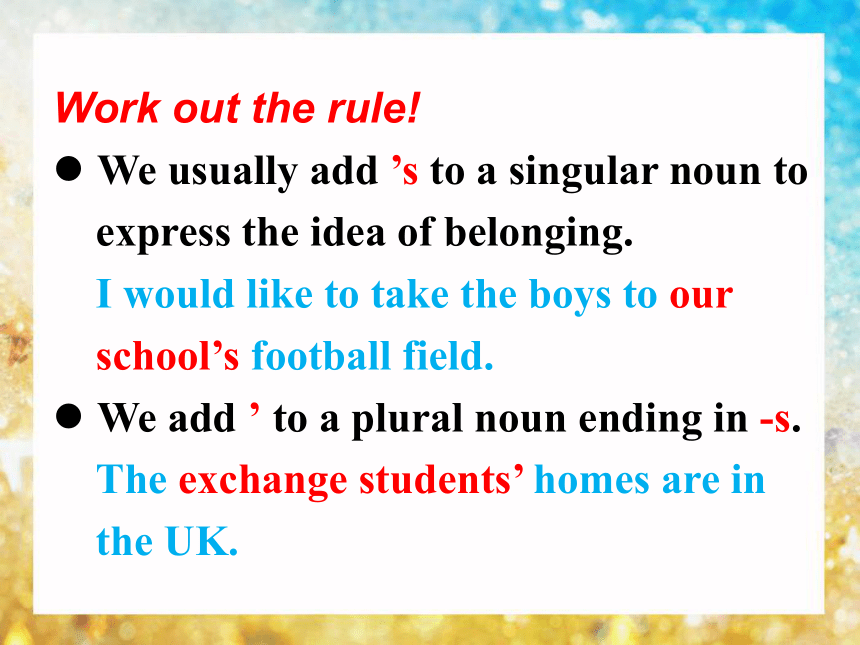
文档简介
(共39张PPT)
postcard
key
ring
key ring
yours
ours
theirs
hers
all over
pencil case
n. 明信片
n. 钥匙
n. 环,圈;戒指
n. 钥匙扣
pron. 你的;你们的
pron. 我们的
pron. 他(或她、它)们的
pron. 她的
到处,遍及
n. 笔盒,笔袋
postcard
key
ring
key ring
pencil cases
This pizza is .
Whose is this/ are these?
It is pizza.
belongs to
a pizza
Eddie’s
Eddie
Eddie’s
It is cap.
belongs to
a cap
Minnie
This cap is .
Minnie’s
Minnie’s
belongs to
our school
It is football field.
a football field
our school’s
This football field is .
our school’s
T-shirts
the twins
They are T-shirts.
belong to
These T-shirts are .
the twins’
the twins’
These pencils are .
the girls
They are pencils.
pencils
belong to
the girls’
the girls’
These pencil cases are .
the children
They are pencil cases.
pencil cases
belong to
the children’s
the children’s
Work out the rule!
We usually add ’s to a singular noun to
express the idea of belonging.
I would like to take the boys to our
school’s football field.
We add ’ to a plural noun ending in -s.
The exchange students’ homes are in
the UK.
We often use ’s with names.
Neil’s mother is calling him from the
UK.
We add ’s to plural nouns that do not
end in -s.
children’s people’s men’s women’s
写出下列词的名词所有格
dog
Sandy
people
theater
children
town
teachers
books
keys
dog’s
Sandy’s
people’s
theatre’s
children’s
town’s
teachers’
books’
keys’
Presents for the students
The students have some presents for the exchange students, but their things got mixed up. Mr Wu is asking Amy which things belong to which people. Help Amy complete the answers.
1. Whose postcards are these? They’re__________.
Millie’s
2. Whose cap is this? It’s _____________.
Daniel’s
3. Whose T-shirt is that? It’s_____________.
Kitty’s
4. Whose key ring is that? It’s ____________.
5. Whose pencils are those? They’re ___________.
Daniel’s
Millie’s
1. What do you buy for your mother on _________ (mother) Day?
2. These are the ________ (student) desks.
3. Football is _____ (boy) favourite sport.
4. On __________ (children) Day, we usually have a good time.
Mother’s
students’
boys’
Children’s
5. 这个茶杯是 Kitty 的。
This cup is _______.
This is _______ cup.
6. 西蒙表弟的朋友都喜欢和西蒙玩。
_______ _________ friends all like playing with Simon.
Kitty’s
Kitty’s
Simon’s cousin’s
belongs to
Mike
This is Mike’s cup.
This is his cup.
This cup is his.
Whose is this?
belongs to
my sister
This is my sister’s poster.
This is her poster.
This poster is hers.
belongs to
the twins
This is the twins’ chocolate.
This is their chocolate.
This chocolate is theirs.
Possessive adjectives and pronouns
人称
代词
(主格) Possessive adjective (形容词性物主代词)
I love my toys.
You your
We our
They their
He loves his
She her
It its
提示
It’s not far from the centre of the city.
it’s = it is
Fish is its favourite food.
its 是形容词性物主代词, 意思为: 它的。
=形容词性物主代词+名词
=my toys
=your toys
=our toys
…
Possessive pronoun(名词性物主代词)
They are mine.
yours.
ours.
theirs.
his.
hers.
Model:
A: Whose pen is this?
B: It’s my pen. The pen is mine.
A: Whose books are these?
B: They are their books. The books are theirs.
Daniel: Look at our books. They’re all over the place.
Millie: Are those _____ books, Amy?
Amy: No, they aren’t ______. They’re Sandy’s. ____ book is under Sandy’s chair.
Sandy: Yes. And _____ is here too, Simon.
your
mine
My
yours
Whose books are they?
Simon: What about that book, Sandy? Is it _____?
Sandy: No. It’s Millie’s.
Daniel: Oh, yes, it’s _____, and here is ___ book. It’s next to Amy’s pencil case.
yours
hers
my
We __________ (need, do not need) to put a noun after a possessive pronoun.
do not need
1. They are not my books. They are ____. (he)
2. Please give this to Susan. It is ___ ( she) pen.
3. We are working hard on ___ (we) project.
4. My flat is on the third floor. _______
(they) is on the tenth floor.
Fill in the blanks with pronouns:
his
her
our
Theirs
5. I can’t find my ruler. Can I borrow ______ ( you)?
6. This is ___ (I) comic book. ______ (you) is over there.
7. Whose car is that? It’s _____ (I).
8. ____ (we) team will win the game.
9. Mrs Wang is ___ (he) English teacher.
10. The cat is ____(she). ___ (it) hair is white.
yours
my
Yours
mine
Our
his
hers
Its
We usually add ’s to a singular noun to express the idea of belonging.
school---school’s cousin---cousin’s
We add ’ to a plural noun ending in -s
friends---friends’ keys---keys’
We add ’s to plural nouns that do not end in -s.
children---children's women---women's
We often use ’s with names.
Kitty---Kitty’s Eddie---Eddie’s
Sum up Noun+’s
We do not need to put a noun after a possessive pronoun.
Sum up Possessive adjectives and pronouns
Possessive adjectives Possessive pronouns
my mine
your yours
our ours
their theirs
his his
her hers
its its
postcard
key
ring
key ring
yours
ours
theirs
hers
all over
pencil case
n. 明信片
n. 钥匙
n. 环,圈;戒指
n. 钥匙扣
pron. 你的;你们的
pron. 我们的
pron. 他(或她、它)们的
pron. 她的
到处,遍及
n. 笔盒,笔袋
postcard
key
ring
key ring
pencil cases
This pizza is .
Whose is this/ are these?
It is pizza.
belongs to
a pizza
Eddie’s
Eddie
Eddie’s
It is cap.
belongs to
a cap
Minnie
This cap is .
Minnie’s
Minnie’s
belongs to
our school
It is football field.
a football field
our school’s
This football field is .
our school’s
T-shirts
the twins
They are T-shirts.
belong to
These T-shirts are .
the twins’
the twins’
These pencils are .
the girls
They are pencils.
pencils
belong to
the girls’
the girls’
These pencil cases are .
the children
They are pencil cases.
pencil cases
belong to
the children’s
the children’s
Work out the rule!
We usually add ’s to a singular noun to
express the idea of belonging.
I would like to take the boys to our
school’s football field.
We add ’ to a plural noun ending in -s.
The exchange students’ homes are in
the UK.
We often use ’s with names.
Neil’s mother is calling him from the
UK.
We add ’s to plural nouns that do not
end in -s.
children’s people’s men’s women’s
写出下列词的名词所有格
dog
Sandy
people
theater
children
town
teachers
books
keys
dog’s
Sandy’s
people’s
theatre’s
children’s
town’s
teachers’
books’
keys’
Presents for the students
The students have some presents for the exchange students, but their things got mixed up. Mr Wu is asking Amy which things belong to which people. Help Amy complete the answers.
1. Whose postcards are these? They’re__________.
Millie’s
2. Whose cap is this? It’s _____________.
Daniel’s
3. Whose T-shirt is that? It’s_____________.
Kitty’s
4. Whose key ring is that? It’s ____________.
5. Whose pencils are those? They’re ___________.
Daniel’s
Millie’s
1. What do you buy for your mother on _________ (mother) Day?
2. These are the ________ (student) desks.
3. Football is _____ (boy) favourite sport.
4. On __________ (children) Day, we usually have a good time.
Mother’s
students’
boys’
Children’s
5. 这个茶杯是 Kitty 的。
This cup is _______.
This is _______ cup.
6. 西蒙表弟的朋友都喜欢和西蒙玩。
_______ _________ friends all like playing with Simon.
Kitty’s
Kitty’s
Simon’s cousin’s
belongs to
Mike
This is Mike’s cup.
This is his cup.
This cup is his.
Whose is this?
belongs to
my sister
This is my sister’s poster.
This is her poster.
This poster is hers.
belongs to
the twins
This is the twins’ chocolate.
This is their chocolate.
This chocolate is theirs.
Possessive adjectives and pronouns
人称
代词
(主格) Possessive adjective (形容词性物主代词)
I love my toys.
You your
We our
They their
He loves his
She her
It its
提示
It’s not far from the centre of the city.
it’s = it is
Fish is its favourite food.
its 是形容词性物主代词, 意思为: 它的。
=形容词性物主代词+名词
=my toys
=your toys
=our toys
…
Possessive pronoun(名词性物主代词)
They are mine.
yours.
ours.
theirs.
his.
hers.
Model:
A: Whose pen is this?
B: It’s my pen. The pen is mine.
A: Whose books are these?
B: They are their books. The books are theirs.
Daniel: Look at our books. They’re all over the place.
Millie: Are those _____ books, Amy?
Amy: No, they aren’t ______. They’re Sandy’s. ____ book is under Sandy’s chair.
Sandy: Yes. And _____ is here too, Simon.
your
mine
My
yours
Whose books are they?
Simon: What about that book, Sandy? Is it _____?
Sandy: No. It’s Millie’s.
Daniel: Oh, yes, it’s _____, and here is ___ book. It’s next to Amy’s pencil case.
yours
hers
my
We __________ (need, do not need) to put a noun after a possessive pronoun.
do not need
1. They are not my books. They are ____. (he)
2. Please give this to Susan. It is ___ ( she) pen.
3. We are working hard on ___ (we) project.
4. My flat is on the third floor. _______
(they) is on the tenth floor.
Fill in the blanks with pronouns:
his
her
our
Theirs
5. I can’t find my ruler. Can I borrow ______ ( you)?
6. This is ___ (I) comic book. ______ (you) is over there.
7. Whose car is that? It’s _____ (I).
8. ____ (we) team will win the game.
9. Mrs Wang is ___ (he) English teacher.
10. The cat is ____(she). ___ (it) hair is white.
yours
my
Yours
mine
Our
his
hers
Its
We usually add ’s to a singular noun to express the idea of belonging.
school---school’s cousin---cousin’s
We add ’ to a plural noun ending in -s
friends---friends’ keys---keys’
We add ’s to plural nouns that do not end in -s.
children---children's women---women's
We often use ’s with names.
Kitty---Kitty’s Eddie---Eddie’s
Sum up Noun+’s
We do not need to put a noun after a possessive pronoun.
Sum up Possessive adjectives and pronouns
Possessive adjectives Possessive pronouns
my mine
your yours
our ours
their theirs
his his
her hers
its its
